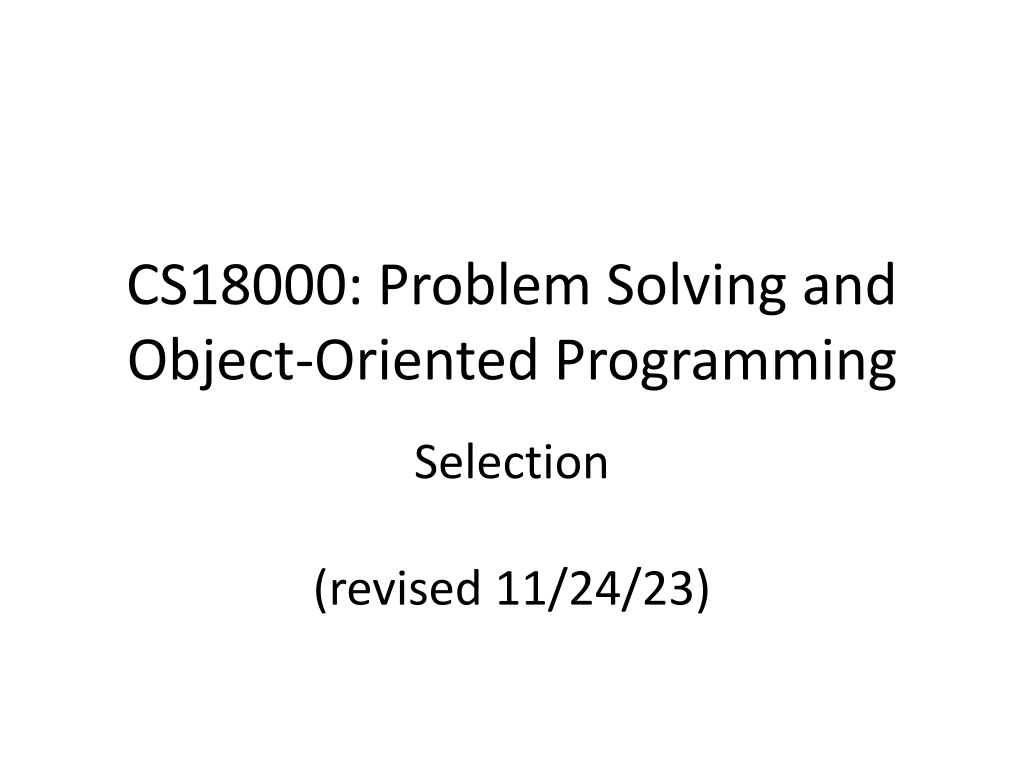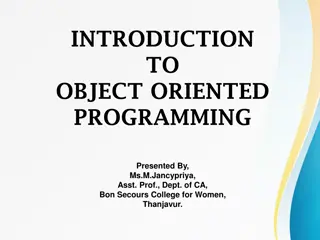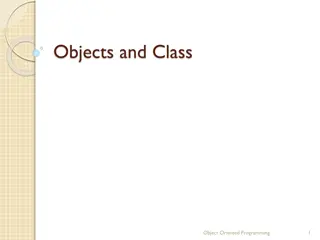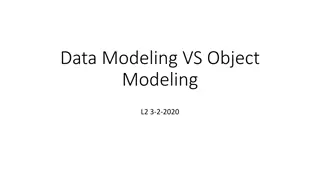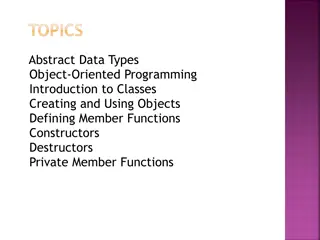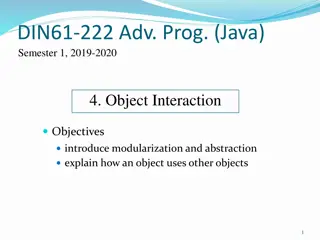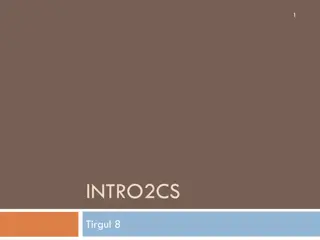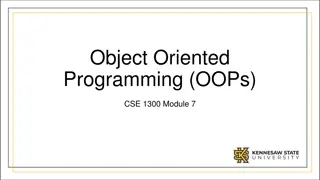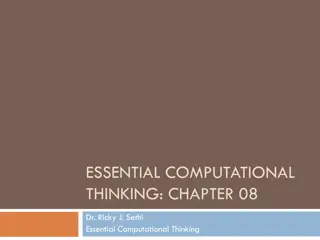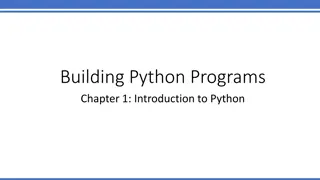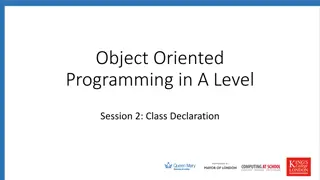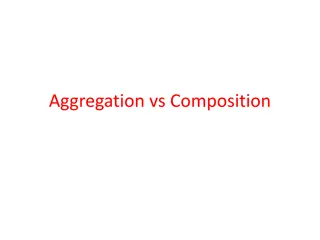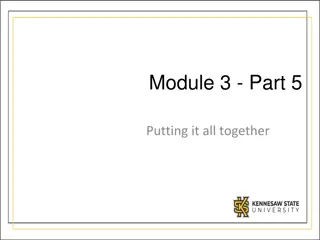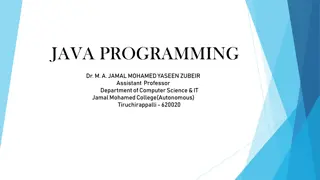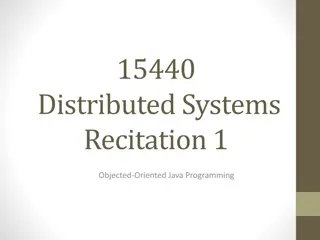Problem Solving and Object-Oriented Programming Selection
This content covers topics such as the if statement, booleans, relations, selection statements, sequential execution, control structures, decision making, primitive type boolean review, and comparing strings in the context of problem-solving and object-oriented programming. It explains concepts like control flow, decision-making processes, logical operators, testing in Java statements, and the nuances of comparing strings.
Download Presentation

Please find below an Image/Link to download the presentation.
The content on the website is provided AS IS for your information and personal use only. It may not be sold, licensed, or shared on other websites without obtaining consent from the author. Download presentation by click this link. If you encounter any issues during the download, it is possible that the publisher has removed the file from their server.
E N D
Presentation Transcript
CS18000: Problem Solving and Object-Oriented Programming Selection (revised 11/24/23)
Video 1 The if statement
Selection Booleans, Relations, and Selection Statements
Sequential Execution By default, a list of statements Statement 1; Statement 2; Statement N; is executed in order, one after another unless there is an error ( exception ), all statements are executed We say, Control flows sequentially. 4
Control Structures Language features (syntax) that affect the flow of control in a program Default control flow is sequential Control flow jumps to methods, then returns Various keywords introduce changes to the default flow if switch while for 5
The if Statement if (boolean-expression) then-statement; next-statement; if (boolean-expression) then-statement; else else-statement; next-statement; 6
Decision Making If it is a weekday and I m not on vacation, then I will get up early If there is a basketball game on and Purdue is playing, I ll cheer for Purdue, otherwise if IU is playing, I ll cheer for their opponent 7
Primitive Type: boolean (Review) Set of two elements { true, false } Set of operations Logical: && (and), || (or), ^ (xor), and ! (not) Testing in various Java statements (e.g., if) Created by comparison operators x < y, x <= y, x == y, x != y, x > y, x >= y And result of logical operators (above) Note: == and != also work with reference types, but only compare references (addresses) not the values 8
Comparing Strings == does not work in the way you might expect Strings are objects == between objects only compares the references (addresses) of the objects Two different String objects with the exact same characters will compare == false (since their objects are stored in different locations) if (s1.equals(s2)) then-statement; 9
Abstracting Conditions If it is a weekday and I m not on vacation, then I will get up early if (isWeekday && !onVacation) getUpEarly(); If there is a basketball game on and Purdue is playing, I ll cheer for Purdue, otherwise if IU is playing, I ll cheer for their opponent if (gameOn(basketball) && playing(purdue)) cheerFor(purdue); else if (gameOn(basketball) && playing(iu)) cheerFor(opponent(iu)); 11
Video 2 Examples using if statements
Problem: SecretWord Write a program that reads a word from the user and prints a message if it matches a secret word in the program. 13
Solution: SecretWord import java.util.Scanner; public class SecretWord { final static String SECRET = awesome"; public static void main(String[] args) { Scanner in = new Scanner(System.in); String word = in.next(); if (word.equals(SECRET)) System.out.printf( "You have said the secret word: '%s'\n", SECRET); } } 14
Problem: Absolute Value Write a program that illustrates how to convert the value in a variable x to the absolute value using an if statement 15
Solution: Absolute Value import java.util.Scanner; public class AbsVal { public static void main(String[] args) { Scanner in = new Scanner(System.in); int x = in.nextInt(); System.out.printf("BEFORE: x = %d\n", x); if (x < 0) x = -x; System.out.printf("AFTER: x = %d\n", x); } } 16
Solution: Absolute Value x = 37 BEFORE: x = 37 AFTER: x = 37 x = -41 BEFORE: x = -41 AFTER: x = 41 17
Problem: DaisyDriveIn If you work more than 20 hours at the Daisy Drive-in, they pay you $16/hour for first 20 hours plus $20/hour for all hours above 20. Otherwise, they pay you $14/hour Write a method double computePay(double hours) that returns the correct pay 18
Solution: DaisyDriveIn public class DaisyDriveIn { double computePay(double hours) { if (hours > 20) return 16.00 * 20 + (hours - 20) * 20.00; else return hours * 14.00; } public static void main(String[] args) { DaisyDriveIn d = new DaisyDriveIn(); double pay; pay = d.computePay(20); // pay should be 280 pay = d.computePay(21); // pay should be 340 pay = d.computePay(9.5); // pay should be 133 pay = d.computePay(9.1); //pay should be 127.40 } } 19
Video 3 More complex if statements
More Selection Statements A few more if-else examples switch statement
Boolean Operations A True B True A || B True A && B True A ^ B False True False True False True False True True False True False False False False False 22
Problem: Median Write a method double median(double a, double b, double c) This example illustrates cascading if-else-if statements 23
Solution: Median double median(double x, double y, double z) { if (x <= y && y <= z || z <= y && y <= x) return y; else if (y <= x && x <= z || z <= x && x <= y) return x; else if (x <= z && z <= y || y <= z && z <= x) return z; else return 0; } 24
Solution: Median x = 12 y = 14 z = 27 median is y x = 14 y = 27 z = 12 median is x x = 24 y = 15 z = 18 median is z 25
Basic Forms of the if Statement if (boolean-expression) statement-if-true; if (boolean-expression) statement-if-true; else statement-if-false; 26
Blocks and Braces Use braces ({}) to group a sequence of statements into a single unit Already seen with method bodies and other examples Also can be use for control structures 27
Block Forms of the if Statement if (boolean-expression) { list-of-statements-if-true; } if (boolean-expression) { list-of-statements-if-true; } else { list-of-statements-if-false; } 28
Video 1 Examples using complex if statements
Problem: Swapper Write a program that, given two values in variables x and y, ensures that y is not less than x (swap them if necessary) 30
Solution: Swapper import java.util.Scanner; public class Swapper { public static void main(String[] args) { Scanner in = new Scanner(System.in); int x = in.nextInt(); int y = in.nextInt(); System.out.printf("BEFORE: x = %d, y = %d\n", x, y); if (y < x) { int t = x; x = y; y = t; } System.out.printf("AFTER: x = %d, y = %d\n", x, y); } } 31
Solution: Swapper x = 36 y = 52 BEFORE: x = 36, y = 52 AFTER: x = 36, y = 52 x = 63 y = 18 BEFORE: x = 63, y = 18 t = 63 x = 18 y = 63 AFTER: x = 18, y = 63 32
Problem: Quadratic Write a method void printRoots(double a, double b, double c) that finds and prints the roots of a quadratic equation (including imaginary roots) ax2 + bx + c = 0 2x2 - 9x + 4 = 0 a=2 b=-9 c=4 d = 81-32 = 49 x1=4.0 x2=0.5 33
Solution: Quadratic // Reference: http://www.1728.org/quadratc.htm public class Quadratic { void printRoots(double a, double b, double c) { double d = b * b - 4 * a * c; if (d < 0) { double x = -b/(2*a), xi = Math.sqrt(-d)/(2*a); System.out.printf("%.2f+%.2fi and %.2f-%.2fi are imaginary roots of %.2fx^2 + %.2fx + %.2f\n", x, xi, x, xi, a, b, c); } else { double x1 = (-b + Math.sqrt(d))/ (2 * a); double x2 = (-b - Math.sqrt(d))/ (2 * a); System.out.printf("%.2f and %.2f are real roots of %.2fx^2 + %.2fx + %.2f\n", x1, x2, a, b, c); } } public static void main(String[] args) { Quadratic q = new Quadratic(); q.printRoots(3, 4, 5); q.printRoots(2, 4, -30); q.printRoots(12, 5, 3); } } 34
Problem: FileExtensions Write a method String findExtension(String filename) that finds the extension in String filename. Example illustrates short-circuit evaluation 35
Problem: FileExtensions String name = new String ( fluffy.jpg ); String ext = findExtension (name); substring [begin, end) [0.0,100.0) starts at 0.0 and goes up to but does not include 100.0 [6,10) is 6, 7, 8, 9 36
FileExtensions (Version 1) String findExtension(String fname) { int dot; if (fname == null) return ""; dot = fname.indexOf('.'); if (dot == -1) return ""; String extension = fname.substring(dot, fname.length()); return extension; } 37
Strings, Empty Strings, Null Pointers String fname = new String ("fluffy.jpg"); fname points to the object that contains the string "fluffy.jpg" String fname = new String (""); fname points to the object that contains the string "" (empty string) String fname = null; fname does not point to a string. It is a null pointer. 38
FileExtensions (Version 2) String findExtension(String fname) { int dot; if (fname == null || fname.indexOf('.') == -1) return ""; dot = fname.indexOf('.'); String extension = fname.substring(dot, fname.length()); return extension; } 39
Short-Circuit Evaluation The Boolean operators && (and) and || (or) abandon evaluation if the result is determined with certainty, e.g., no matter what whatever is true || (whatever) -> must be true false && (whatever) -> must be false In these cases, whatever is not evaluated Common use: p != null && p.isImportant() Second expression would cause null pointer exception if p were null 40
Video 2 Special cases with if statements
Dangling Else Problem if (familyVisiting) if (isWarmOut) goToPark(); else hangoutWithFriends(); The else clause goes with the most recent if, not as formatted above if (familyVisiting) if (isWarmOut) goToPark(); else hangoutWithFriends(); Use braces to disambiguate 42
Problem: ChangeBack Comparing real valued quantities for equality You gave the waiter a $10 bill double paid = 10.00; The check was $9.10 double check = 9.10; The waiter gave you 90 cents back double change = 0.90; Is it correct? (paid check) == change 43
Solution: ChangeBack public class ChangeBack { double computeChange(double check, double paid) { return paid - check; } public static void main(String[] args) { ChangeBack c = new ChangeBack(); double change; change = c.computeChange(8, 10); // 2.00 change = c.computeChange(9.10, 10); // 0.90 } } 44
Comparing Real Values Since real numbers represented with double and float are imprecise Comparisons may fail when they shouldn t Common trick: Replace if (x == y) By if (Math.abs(x y) < epsilon) For some small value, epsilon if (Math.abs(c.computeChange(9.10, 10) 0.90) < 0.001) { } 45
Ternary Assignment Operator A common situation is to assign one of two alternative values depending on a condition if (a < b) minVal = a; else minVal = b; We can use the following equivalent statement minVal = (a < b)? a : b; 46
Video 3 Switch statement
Problem: Days Write a method that returns the number of days in a given month from a given year int daysInMonth(int month, int year) 48
Solution 1: Days int daysInMonth1(int month, int year) { if (month == 1) // January return 31; else if (month == 2) { LeapYear ly = new LeapYear(); if (ly.isLeapYear(year)) return 29; else return 28; } else if (month == 3) return 31; else if (month == 4) return 30; else if (month == 5) return 31; else if (month == 6) return 30; else if (month == 7) return 31; else if (month == 8) return 31; else if (month == 9) return 30; else if (month == 10) return 31; else if (month == 11) return 30; else if (month == 12) return 31; return -1; } 49
Solution 2: Days int daysInMonth2 (int month, int year) { switch (month) { case 1: case 3: case 5: case 7: case 8: case 10: case 12: return 31; case 4: case 6: case 9: case 11: return 30; case 2: LeapYear ly = new LeapYear(); if (ly.isLeapYear(year)) return 29; else return 28; } return -1; } 50
